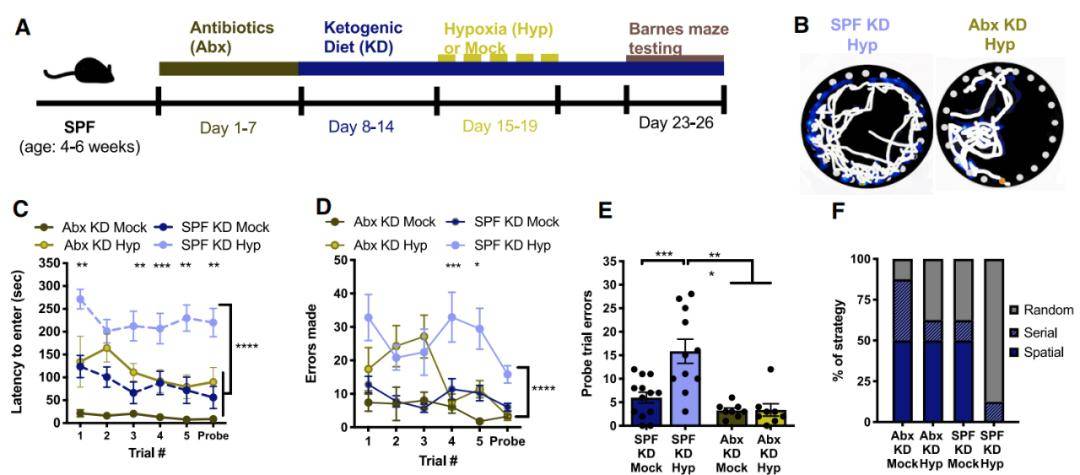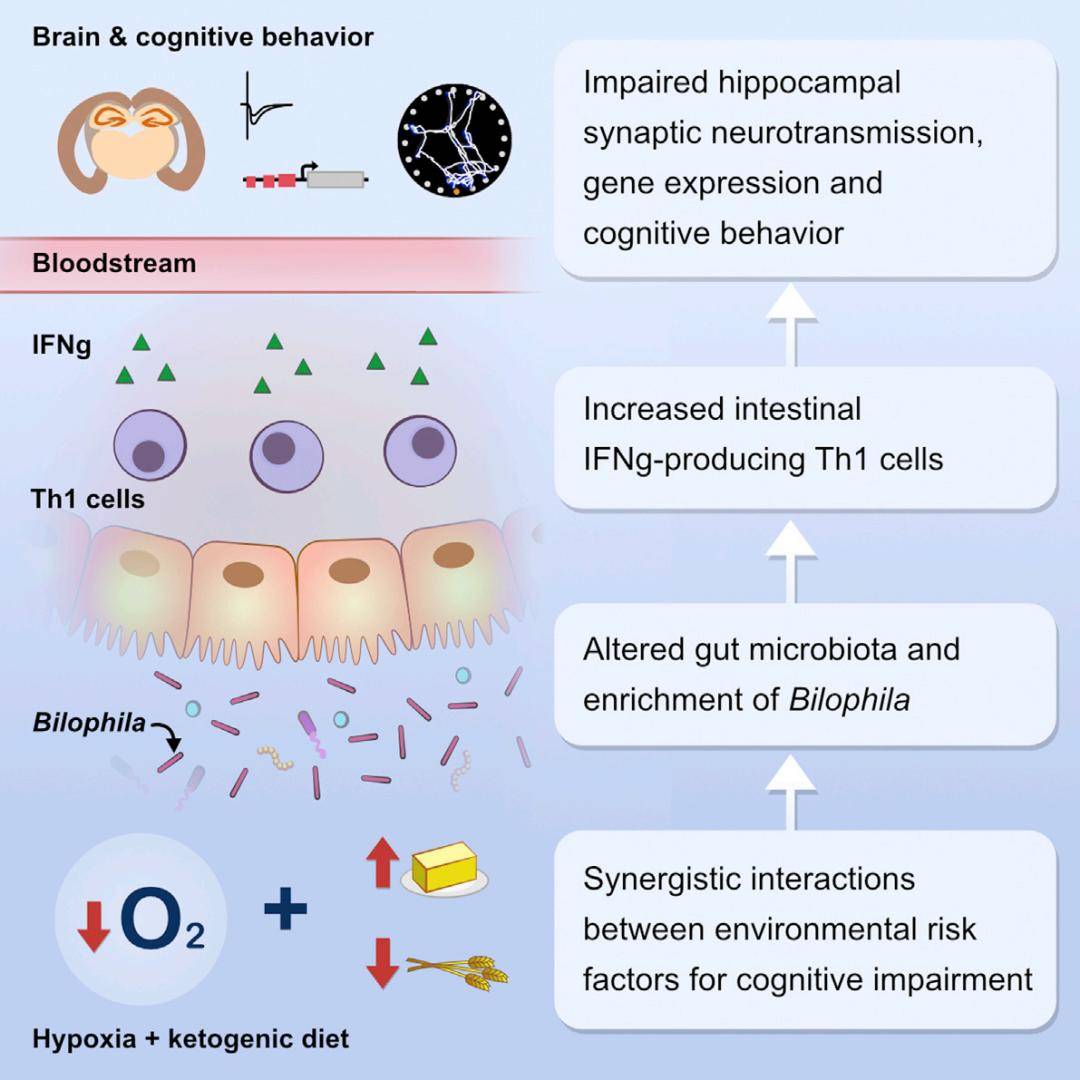肠道|《细胞》子刊:生酮饮食再爆弊端( 二 )
这下足以说明 , 生酮饮食能够加剧间歇性缺氧引起的认知障碍 , 是肠道菌群在其中作梗 。

文章图片
没有了肠道菌群 , 间歇性缺氧条件下进行生酮饮食的小鼠 , 认知障碍有所缓解 。
(Abx:广谱抗生素)
既然锁定了是肠道菌群影响了认知障碍 , 那么是何方菌群在此作乱 , 又作了什么乱?
通过对比分析不同供氧条件下进行生酮饮食的小鼠粪便 , A.Olson和她的同事们发现两类菌群的丰度有差异:间歇性缺氧的小鼠粪便中 , Bilophila菌群丰度更高 , Clostridium cocleatum菌群丰度更低 。 经过粪便菌群定植 , 发现Bilophila菌群的富集对于生酮饮食加剧间歇性缺氧引起认知障碍的作用才是至关重要 。
进一步研究发现 , Bilophila菌群是通过引起小鼠体内表达IFNg的Th1细胞增多 , 从而对海马体功能(hippocampal activity)造成损伤的 。

文章图片
在生酮饮食和间歇性缺氧的条件下 , Bilophila菌群富集 , 导致表达IFNg的Th1细胞增多 , 从而引起认知障碍 。
总而言之 , 研究者们发现生酮饮食会加剧间歇性缺氧引起的认知障碍 , 并且是由肠道菌群所介导 。 在生酮饮食和间歇性缺氧的双重条件下 , 肠道菌群Bilophila富集 , 引起表达IFNg的Th1细胞数量增多 , 进而对海马体功能造成损伤 , 增加认知障碍的风险 。
不过 , 这其中具体的分子机制还不得而知 , 需要后续的探索 。
看来 , “吃“确实是个大学问 。 无论是医学指导下的减肥计划 , 还是神经退化和认知障碍的治疗方案 , 进行生酮饮食时的注意事项又多了一个~
参考文献:
[1]Wiers, C. E. et al. Ketogenic diet reduces alcohol withdrawal symptoms in humans and alcohol intake in rodents. Sci Adv 7, doi:10.1126/sciadv.abf6780 (2021).
[2]Goldberg E L, Molony R D, Kudo E, et al. Ketogenic diet activates protective γδ T cell responses against influenza virus infection[J]. Science immunology, 2019, 4(41).
[3]Abbasi J. Interest in the Ketogenic Diet Grows for Weight Loss and Type 2 Diabetes. JAMA. 2018 Jan 16;319(3):215-217.
[4][3] Bueno NB, de Melo IS, de Oliveira SL, da Rocha Ataide T. Very-low-carbohydrate ketogenic diet v. low-fat diet for long-term weight loss: a meta-analysis of randomised controlled trials. Br J Nutr. 2013 Oct;110(7):1178-87.
[5]Olson CA, I?iguez AJ, Yang GE, Fang P, Pronovost GN, Jameson KG, Rendon TK, Paramo J, Barlow JT, Ismagilov RF, Hsiao EY. Alterations in the gut microbiota contribute to cognitive impairment induced by the ketogenic diet and hypoxia. Cell Host Microbe. 2021 Jul 30:S1931-3128(21)00337-1.
[6]Bahr, L.S., Bock, M., Liebscher, D., Bellmann-Strobl, J., Franz, L., Pru?, A., € Schumann, D., Piper, S.K., Kessler, C.S., Steckhan, N., et al. (2020).Ketogenic diet and fasting diet as Nutritional Approaches in Multiple Sclerosis (NAMS): protocol of a randomized controlled study. Trials 21, 3.
[7]Lauritzen, K.H., Hasan-Olive, M.M., Regnell, C.E., Kleppa, L., ScheibyeKnudsen, M., Gjedde, A., Klungland, A., Bohr, V.A., Storm-Mathisen, J., and Bergersen, L.H. (2016). A ketogenic diet accelerates neurodegeneration in mice with induced mitochondrial DNA toxicity in the forebrain. Neurobiol.Aging 48, 34–47.
[8]Phillips, M.C.L., Murtagh, D.K.J., Gilbertson, L.J., Asztely, F.J.S., and Lynch,C.D.P. (2018). Low-fat versus ketogenic diet in Parkinson’s disease: a pilot randomized controlled trial. Mov. Disord. 33, 1306–1314.
[9]van Berkel, A.A., IJff, D.M., and Verkuyl, J.M. (2018). Cognitive benefits of the ketogenic diet in patients with epilepsy: A systematic overview. Epilepsy Behav 87, 69–77.
[10]O’Toole, P.W., and Jeffery, I.B. (2015). Gut microbiota and aging. Science 350,1214–1215.
- 卫生室|《乡村医生诊疗口袋书(先行本)》面世
- 按摩|你知道吗?间充质干细胞可以改善失眠症状
- 肝细胞|夏季来了,多吃以下3种食物,滋养皮肤,也可以淡化斑点
- 肝细胞|想长寿先养肝,多吃三种蔬菜,养肝护肝,滋补身体,脸色更红润
- 解读|《浙江省医院门诊管理办法》政策解读
- 廉东波|《健谈》观点丨浅表性胃炎三五年复查一次 萎缩性胃炎一年一查
- 家长|杭州《青少年皮肤健康状况调研》发布,近半青少年受皮肤疾病困扰
- 造血干细胞移植|保留脐带血,要还是不要?血液病专家告诉你答案,不用纠结了
- 韩美|一家益全家型益生菌为肠道健康加冕,助力打工人更好奋斗
- 肝细胞|肝不好的人,记住多喝3水,少吃1物,肝病会悄悄溜走
